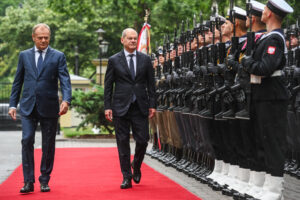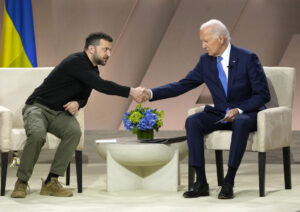When Poland joined Nato 25 years ago, it did so to solve an existential problem that it had been plagued by for centuries — the perennial threat of invasion by Germany from the west and Russia from the east. By becoming part of the alliance, Poland neutralised the menace to its west by joining forces with a reunited and (ostensibly) pacified Germany, and eliminated the Russian threat to its east through collective deterrence — at least in theory.
But geopolitics is never so simple, and the nature of conflict has changed dramatically since then. As Russia’s hybrid-war against Poland since 2021 has demonstrated, the latter has had to face a growing and increasingly complex set of pressures from both the Kremlin and its ally Belarus that Nato has had little ability to combat. And since 2022, despite its hopes that its worst security fears could be safely confined to history, Poland has witnessed foreign projectiles striking its territory for the first time since the Second World War.
Although the errant Ukrainian air defence missile that killed two Poles during a Russian barrage on Ukraine in November 2022 garnered the most international attention, incidents of this sort have continued to take place since. In May, I wrote about the discovery of a Russian missile in central Poland that had flown undeterred for up to 500 kilometres before landing just west of a major Polish city, and most recently, in late August, Polish authorities reported that a Russian drone had entered Polish airspace and likely crashed into its territory.
In the days since, Polish ministers have stated that they have not been able to find any trace of the drone, and have qualified their previous claims. Nevertheless, such apparent penetrations of Poland’s hard-won security bubble have come as a shock to the Polish public, whose historically ingrained aversion to aggressive foreign intrusion has made it eager to support proactive measures to defend every inch of the country. In the wake of the most recent incident last month, a survey found that 59% of Poles unequivocally supported Poland shooting down Russian projectiles moving in the country’s direction while still in Ukrainian airspace, which would give Polish pilots and air defence systems ample time to respond to them before they have a chance to threaten Poland itself.
Calls for such a bold change in policy have been growing in Poland since the spring, and finally reached a fever pitch this week when Poland’s outspoken Foreign Minister Radosław Sikorski told the The Financial Times that it is the country’s “duty” to down Russian missiles heading toward Polish, and by extension Nato, territory. A proposal to do exactly that had been featured in a landmark defence cooperation agreement signed by Ukraine and Poland back in July — but had been quickly rebuffed by Nato’s Secretary General Jens Stoltenberg, who claimed such moves could risk the alliance “becoming a part of the conflict” in Ukraine. Following Sikorski’s most recent comments, in which he claimed that Poland’s Nato membership should not stop it from pursuing its own security agenda, Nato spokespeople have doubled down on Stoltenberg’s pronouncement, claiming that Nato “is not a party to the conflict and will not become a party to the conflict”.
Nato, however, has offered no alternative solutions for how to handle the spillover from the war in Ukraine onto its territory. The European Union too, despite endorsing a Polish-Greek proposal earlier this year for the construction of a pan-European air defence infrastructure, has allowed discussion of the matter to languish in meetings. A disconnect between the alliance’s leadership and its eastern members, who have for years been lauded as its future visionaries, is painfully evident — while cautious Nato and EU leaders in Brussels are most concerned with the optics of such a change in policy and what it may mean for Nato’s role in Ukraine, in countries like Poland, the issue is far from an abstract one, and is connected to immediate national security concerns that require creative solutions within the active Ukrainian battlespace itself. If Nato is unwilling or unable to provide solutions for the threats Poland regularly faces over its own airspace, the least it could do is get out of the way to let Poland keep itself safe in whatever ways it sees fit.
The reality is that Nato is an alliance that was built to respond to the risks of the Cold War and the post-1945 era, and its Article V provision only truly protects Poland and other countries along its eastern flank from outright invasion or aggressive attack. Wayward missiles and drones that “accidentally” enter Nato airspace are much more difficult to guard against, and are thus able to fly under the radar (pun intended) of Nato’s collective defence framework while still posing a very real risk to the alliance’s member states.
Such incidents are not just a Polish problem either — Russian drones have repeatedly breached and crash landed in Romanian territory since 2022 as well. But even beyond Nato’s east, looking at the big picture, the prospect of enemy projectiles recurrently hitting its soil in the absence of any real policy that would deter them is a recipe for disaster, and makes an eventual Article V declaration against Russia more likely than if member states were allowed to preemptively shoot its missiles and drones down before they reached Nato territory. Despite Nato’s claims otherwise, and certainly in Russia’s eyes, the alliance is already a participant in the Ukraine conflict, and pretending otherwise is potentially much riskier than walking on eggshells to avoid provoking a Russian escalation.
Poland and other frontline states would hardly be the first actors to look out for their own well-being by downing projectiles flying around in their own neighbourhood, even those not intended to hit their territory. During Iran’s attack on Israel in April, the Jordanian Air Force proactively took out dozens of Iranian drones that entered its airspace en route to their destination, and although Iran certainly wasn’t pleased, no physical Iranian threat against Jordan has since materialised. Russia too can talk tough, but as it has shown time and time again throughout the war, its threats of escalation amount to little more than an uptick in sabotage activity against the West and headline grabbing provocations against frontline states. There is little more Moscow could realistically do, especially in this case — intentionally striking a Nato state in response to missile interceptions over Ukraine or anywhere else would not only be incredibly disproportionate, but would cross the threshold into triggering the alliance’s Article V tripwire. Until a truly existential threat emerges to Russia or its military might, low-grade hybrid warfare will be the name of the game.
The debate about states like Poland and Romania using their air defence architecture to shoot down Russian missiles has another dimension however — if these countries have the capacity to take out projectiles moving toward their borders, what’s stopping them from shooting down any Russian missiles within the range of their surface-to-air missiles over Ukraine? This is exactly what Ukraine’s foreign minister Dmytro Kuleba has been pushing allies to do since June, suggesting that Poland use Patriot missile systems stationed along its borders to effectively create a no-fly zone over western Ukraine. The implications of such a solution would be enormous for security in the country — with a range of 160 kilometres, strategically placed Polish Patriots would be able to provide air cover for Ukrainian cities like Lviv and Lutsk, which have both been pounded by Russian missiles over the past month.
Whether or not Poland will have the necessary assets to secure its own skies as well as those of Ukraine’s west remains an open question, but within the emerging paradigm in which Polish leaders like Sikorski have appeared willing to act independently of Nato on certain security matters, such a scenario is no longer entirely off the table. While Poland will likely be wary of openly defying Stoltenberg’s dictums for the time being, its rising star within Nato means that where Warsaw goes, so eventually goes the alliance. Poland’s clout may well allow it to bring a new security framework into being that gives frontline states greater leeway to protect themselves and their borders without micromanagement from Nato HQ — and all of Nato will be better for it.
Disclaimer
Some of the posts we share are controversial and we do not necessarily agree with them in the whole extend. Sometimes we agree with the content or part of it but we do not agree with the narration or language. Nevertheless we find them somehow interesting, valuable and/or informative or we share them, because we strongly believe in freedom of speech, free press and journalism. We strongly encourage you to have a critical approach to all the content, do your own research and analysis to build your own opinion.
We would be glad to have your feedback.
Source: UnHerd Read the original article here: https://unherd.com/




